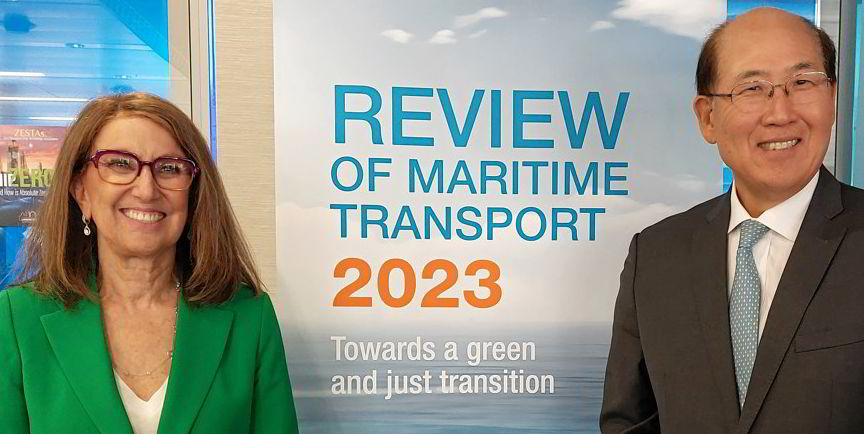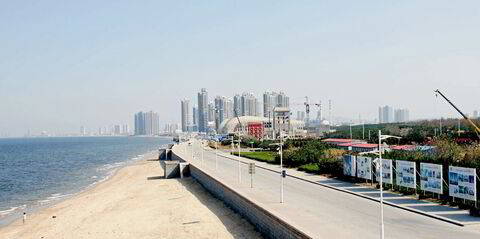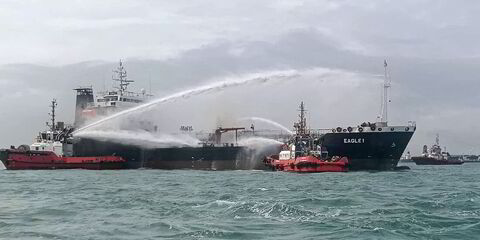The United Nations’ trade body has backed plans to impose a $100-per-tonne levy on shipping carbon emissions to tackle the soaring coast of building a zero-emission global fleet and a green bunkering network.
The proposed levy — one of several competing funding proposals being discussed at the International Maritime Organization — would pay a significant part of the annual bill of up to $118bn needed to turn shipping into a net zero industry by 2050, according to officials.
Most of the spending — between $28bn and $90bn a year — is needed to create the global infrastructure for carbon-neutral fuels, the UN Conference on Trade & Development (Unctad) said in its annual review of maritime transport published on Wednesday.
The cost to decarbonise ships alone is estimated at between $8bn and $28bn every year to 2050, according to the report, based on figures supplied by class society DNV.
The scale of the challenge was highlighted by data showing that carbon emissions from international shipping were 20% higher than 10 years earlier.
Seaborne grain and oil travelled longer distances than ever before in 2022 following Russia’s invasion of Ukraine and subsequent disruption to trade routes.
“Maritime transport needs to decarbonise as soon as possible,” said Unctad secretary general Rebeca Grynspan.
“This vital sector contributes 3% of global greenhouse gas emissions. There’s a lot to be done to modernise this sector.”
The $100-per-tonne of C02 fee to all international shipping voyages has been championed by the Marshall Islands and Solomon Islands. Officials said it has the advantage of taxing polluters while garnering significant profits to invest in ports and shipping for less developed countries.
The IMO plans to adopt a carbon pricing mechanism by 2025 and is carrying out impact studies on the different proposals. China and South American countries have expressed concerns over the impact of a carbon levy scheme on their economies.
The measure is viewed as critical to encouraging shipowners to decarbonise and compensate them for using expensive low-carbon fuels, but agreement has been hard to reach.
Alternative proposals include a “feebate” scheme from Japan, a “fund and reward” plan from the International Chamber of Shipping and an emissions trading scheme from the European Union.
“The levy on emissions would do two things — it would be a levy on pollution, and the energy sources that are clean will become much more competitive,” Shamika Sirimanne, director of Unctad’s technology & logistics division, told TradeWinds.
“On the other hand, whatever money they will collect is there to support vulnerable countries that are really going to be affected on the path to decarbonisation.”
Surging fuel costs
Unctad warned that full decarbonisation could double fuel costs, which would have a big impact on least developed countries that rely on shipping to import goods.
While very low sulphur fuel oil was priced at about $635 per tonne in December 2022, a comparable price for ammonia would be $1,239 and for methanol $1,400, the report said.
The International Energy Agency predicted on Monday that ammonia would corner 44% of the market if shipping becomes net zero by 2050.
The potential total cost of the decarbonisation drive over 27 years — amounting to more than $3tr on top of existing investments — is greater than some previous estimates of the cost of cleaning up the fleet.
The Getting to Zero Coalition — an alliance of more than 200 companies and organisations — estimated in a report in 2020 that it would cost up to $1.9trn to achieve the target.
The IMO set more ambitious targets for decarbonisation in July after coming under pressure over its previous goal of halving emissions by 2050.
But the ICS warned this week that the IMO’s ability to drive through that ambition could be hampered by political division within the 185-member body, linked in part to the invasion of Ukraine.
Read more
- ICS head Emanuele Grimaldi urges talks, not trade wars, and warns against ‘American dreams’
- Russia to stand for IMO council role despite boycott threat
- Seaspan tackles ‘huge concerns’ over ammonia container ship plans
- Green Seas: The era of methanol-fuelled container shipping begins
- Insurance underwriters gather as marine market hangs in the balance




